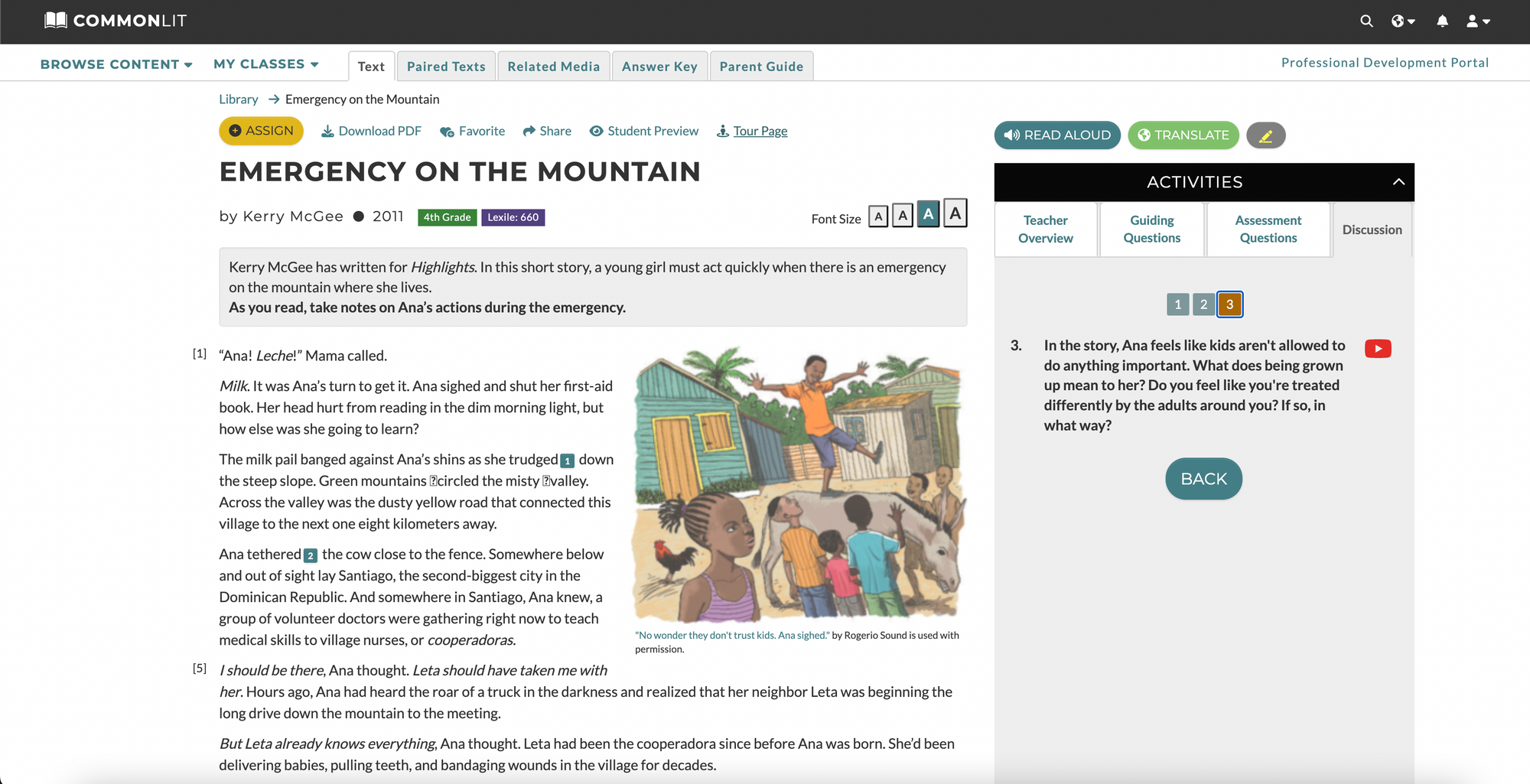 Elementary Classrooms
Engage Young Readers with Relatable Short Stories about Coming-of-Age
Elementary Classrooms
Engage Young Readers with Relatable Short Stories about Coming-of-Age
Check out CommonLit’s selection of high-quality short stories with coming-of-age themes for your elementary students.
At CommonLit, you’ll find hundreds of short stories that will not only elevate students’ reading comprehension, but also immerse them in a rich reading experience.
In this blog post, we’ll explore 6 coming-of-age short stories that elementary students can reflect on as they shape their understanding of the world and navigate through challenging situations. We’ll also share some tips to help students make self-to-text connections.
“Domino Sundays” by Vivian Fernandez (3rd Grade)
After watching her grandfather and his friends play dominos in the park for many years, Yolanda’s grandfather invites her to play. Yolanda is excited to team up with her grandfather, and together, they beat his friends.
Lead a classroom discussion on this short story with Discussion Question 2: “Yolanda is happy to finally be invited to play dominoes with Abuelo and his friends. What are some games or activities that you could not do until you got older? How did it feel when you could not do them? How did it feel when you were old enough to do them?”
“The Sign of the Cat” by Sandra Havriluk (3rd Grade)
Set in the Great Depression, a young boy named Chet lives with his grandmother who takes in people in need. At first, Chet doesn’t like that he has to share his food and home with strangers, until he discovers that his father found refuge in other people’s homes when he worked far away. After he learns about his father’s past, Chet develops empathy for the people staying in his family’s home.
Challenge your young readers to explore Chet’s character development with Discussion Question 1: “In the story, Chet doesn’t want people to come to the house for food and shelter. How do his views on this change? Do you think this is an example of Chet growing up? Why or why not?”
“The Kids’ Table” by Anita Celli (4th Grade)
As the oldest cousin, James dreads spending another Thanksgiving dinner at the kids’ table. After his aunt invites him to join the adults' table, James realizes that he misses the kids’ table where his cousins looked up to him. James’ decision to rejoin with the younger kids and help them behave reveals his maturity.
Present this video about growing up to help students shape their understanding of true maturity. Then, ask students to compare what growing up means to James in the story with what growing up means to the kids in the video. Follow-up with these questions: “How do the kids feel about growing up? Do you want to be a grown up? Why or why not?”
“Emergency on the Mountain” by Kerry McGee (4th Grade)
Ana is disappointed when her neighbor, Leta, doesn’t allow her to volunteer as a doctor in another village because she is too young. However, when a medical emergency arises in her village, Ana takes charge. Despite her age, Ana proves she’s responsible enough to handle difficult situations when she gathers the people in her village to help a friend.
Have students explore Discussion Question 3: “In the story, Ana feels like kids aren't allowed to do anything important. What does being grown up mean to her? Do you feel like you're treated differently by the adults around you? If so, in what way?”

“Clarity” by Peter Ryan (5th Grade)
In this fantasy short story, wizards allow non-magical people to learn one spell on their fifteenth birthday, which they can use for the rest of their life. When the protagonist, Liam, comes of age, his parents do not share their opinions on which spell he should choose, so that he can make this important decision on his own free from influence.
Ask your students Discussion Question 2: “Liam's parents are not allowed to go with him while he chooses the spell. Think of a time you had to make a big decision in your life without an adult. How did you feel? Did you wish there was an adult there to help you? Why or why not?”
“Eleven” by Sandra Cisneros (5th Grade)
When Rachel’s teacher, Mrs. Price, finds a red sweater, she is convinced that it belongs to Rachel. Although Rachel says that it doesn’t belong to her, Mrs. Price makes her wear it. Frustrated, Rachel wishes that she is older so that her words can hold as much authority as an adult’s.
Encourage your students to make text-to-self connections with Discussion Question 2: “How does Rachel think she will change with age? Explain if you agree or disagree with Rachel's ideas about growing up.”
Next Steps
Looking for more great short stories with coming-of-age themes for elementary students? Check out our CommonLit library!
If you’re interested in learning all about CommonLit’s free digital literacy program, join one of our upcoming webinars!

